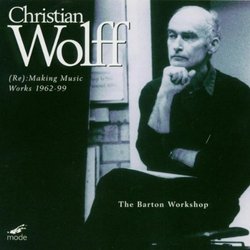| All Artists: Christian Wolff, James Fulkerson, The Barton Workshop, Frank Denyer, Nicola Walker-Smith Title: Christian Wolff: (Re:) Making Music - Works 1962-99 Members Wishing: 1 Total Copies: 0 Label: Mode Release Date: 4/6/2004 Genres: Jazz, Special Interest, Pop, Classical Styles: Avant Garde & Free Jazz, Experimental Music, Vocal Pop, Chamber Music, Historical Periods, Classical (c.1770-1830), Modern, 20th, & 21st Century, Instruments, Electronic Number of Discs: 2 SwapaCD Credits: 2 UPC: 764593013327 |
Search - Christian Wolff, James Fulkerson, The Barton Workshop :: Christian Wolff: (Re:) Making Music - Works 1962-99
 | Christian Wolff, James Fulkerson, The Barton Workshop Christian Wolff: (Re:) Making Music - Works 1962-99 Genres: Jazz, Special Interest, Pop, Classical |
Larger Image |
CD Details |
CD ReviewsGreat imagery in seldom heard settings scarecrow | Chicago, Illinois United States | 10/13/2004 (5 out of 5 stars) "It is many times difficult to comprehend why a composer, a creative artist turns to the lifeworlds of politics to find him/herself,to locate and appraise materials to transform them into dramatic works.We are taught in our "democratic" institutions never to mix the dangers of politics and art, the two have no real affinity for each other, we are told. But the post-war avant-garde grew elitist,wrote a music for no one, harboring the torch of modernity. Soon however the modern grew institutionailzed the very places it loath to be and monopolies of commissions and opportunities became commonplace as you may find in France today, right now,or the marginalization of creative artists from lack of funds(mostly the USA)where the lion's share of funds is saved for establishment venues, who merely stick out their hand for money.
Christian Wolff's turn to a politics, Democratic socialism to be specific in the later Sixties, was logical move, a committed one, one that would prove to bear much fruit, with the ant-War rebellions on USA campuses and streets and in the major capitials of Europe, something we see again. For Wolff emerged from the New York John Cage mileau of creativity,where his music(the Fifties and Sixties) was process oriented allowing performative freedoms to the musician with graphic notations and minimal instructions with many times mixed musical results, however the results here(the aesthetic object) was not the only end of this music. It was not until he began adopting these same techniques and approaches now attached committed to the political image where (to my mind) Wolff's imagination found fertile ground. The ensemble pieces included on these two CDs is music seldom heard in any performative venue, in fact here is the only place you will ever hear this music. Wolff's music we hear has a raw unfinished quality to it,somewhat like Chas Ives in concept and gesture, opaque much of the time with a plaintive simple melody sometimes emerging from the welter, the texture of things. It continues to be truly modern in its ongoing affinity for timbre, the love of pure timbre, of exposed lines not really resolving themselves just pure tension to equal the subject matter, as the anxiety-ridden life of Emma Goldman here. Emma once said, "If I can't dance I don't want a revolution" meaning that a revolution does not really transform every dimension of the lifeworld. As you work your way through these disks the probelm emerges that Wolff many times leaves many performative decisions to the musicians themselves which does not make for interesting listening. I overall did not find myself bored however, sometimes the length of the piece is too long, overextends its premise. I found this here in the viola solos. Perhaps Wolff should discover the concept of the musical miniature. The Barton Workshop are a committed bunch to Wolff's music and have done and performed live this repertoire numerously. It is difficult music to listen to many times for Wolff's contrapuntal lines may look wonderful on paper but not when commenced in the real auditory world. Still you struggle through this music for you sense the imaginative power the political subject imparts here as "Dark as a Dungeon" after a tune of Kentucky coal miners,You sense Wolff's ongoing creativity that enriches the chamber music genre, gentle,questioning and fully enamored over what the instrument can offer the imagination." |
